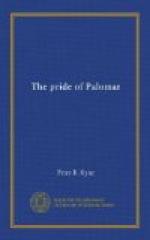Farrel began to chuckle.
“Good old dad!” he cried. “Put over a dirty Irish trick on you to gain time!”
“He did. I do not blame him for it. I would have done the same thing myself under the same circumstances.” And Parker had the grace to join in the laugh. “When I filed suit for foreclosure,” he continued, “he appeared in court and testified that the property belonged to his son, who was in the military service, in consequence of which the suit for foreclosure could not be pressed until after said son’s discharge from the service.”
“All praise to the power of the war-time moratoriums,” Farrel declared. “I suppose you re-entered the suit as soon as the report of my death reached you.”
Parker chuckled.
“I did, Mr. Farrel, and secured a judgment. Then I took possession.”
“Aren’t you the picture of bad luck? Just when everything is shaping up beautifully for you, I appear in the flesh as exhibit A in the contention that your second judgment will now have to be set aside, because, at the time it was entered, it conflicted with the provisions of that blessed moratorium.” Don Miguel smiled mirthlessly.
“There’s luck in odd numbers,” Parker retorted, dryly. “The next time I shall make that judgment stick.”
“Well, at any rate, all these false starts help me out wonderfully,” Don Miguel reminded him. “As matters stand this morning, the mortgage hasn’t been foreclosed at all; consequently, you are really and truly my guests and doubly welcome to my poor house.” He rose and stretched himself, gazing down the while at Parker, who regarded him quizzically. “Thank you for the interview, Mr. Parker. I imagine we’ve had our first and last business discussion. When you are ready to enter your third suit for foreclosure, I’ll drop round to your attorney’s office, accept service of the summons, appear in court, and confess judgment.” Fell a silence. Then, “Do you enjoy the study of people, sir?” Don Miguel demanded, apropos of nothing.
“Not particularly, Mr. Farrel. Of course, I try to know the man I’m doing business with, and I study him accordingly, but that is all.”
“I have not made myself explicit,” his host replied. “The racial impulses which I observed cropping out in my father—first Irish, then Spanish—and a similar observance of the raised impulses of the peons of this country, all of whom are Indian, with a faint admixture of Spanish blood—always interested me. I agree with Pope that ’the proper study of mankind is man.’ I find it most interesting.”
“For instance?” Parker queried. He had a feeling that in any conversation other than business which he might indulge in with this young man he would speedily find himself, as it were, in deep water close to the shore.
“I was thinking of my father. In looking through his effects last night, I came across indubitable evidence of his Celtic blood. Following the futile pursuit of an enemy for a quarter of a century, he died and left the unfinished job to me. Had he been all Spanish, he would have wearied of the pursuit a decade ago.”




